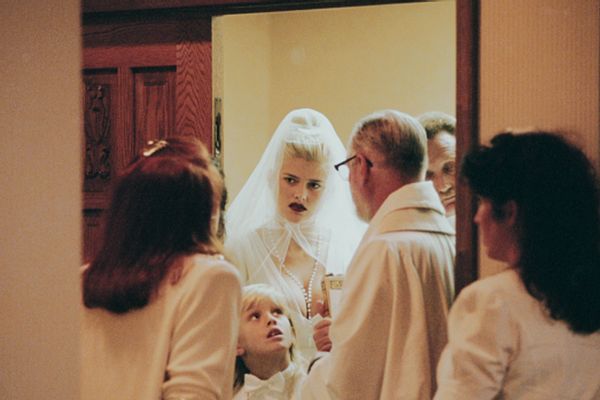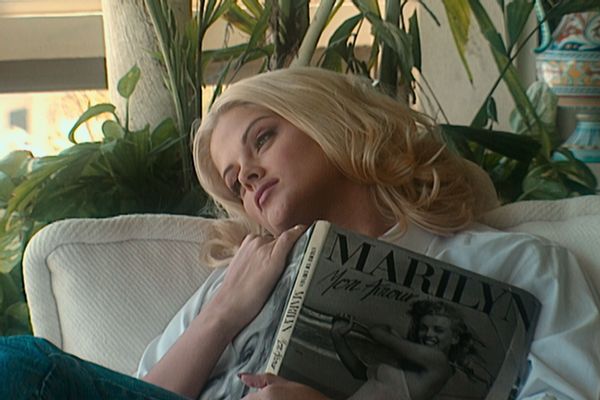
Many of the people in Smith's life, from doctors to lawyers, and eventually the public, wrote her off as a manipulative, drug-addicted gold digger.
Netflix's documentary "Anna Nicole Smith: You Don't Know Me" premiered May 16, about the blonde bombshell best known for being a Guess Jeans model in the '90s, for her E! Channel reality show and for marrying elderly oil tycoon J. Howard Marshall II, for which she received much public criticism. Her life was arguably a sad one in many ways, but in watching her documentary, I wondered about the brief narrative spun around Smith. Is that all she was – a tragic cautionary tale for young girls with dreams of Hollywood stardom?
Anna Nicole Smith was born Vickie Lynn Hogan in the small town of Mexia, Texas in 1967. She was a girl who always had big dreams, but was – according to her uncle – always out chasing boys. The documentary includes interviews from family members, friends and employees as well as a lot of never-before-seen footage. As an adult, she moved to the big city of Houston and began dancing at a topless bar. In 1991, at 23 years old, an 86-year-old customer by the name of J. Howard Marshall came into the club and was the man who would become her husband. Marshall was a billionaire – with a "b" – from Texas oil money.
Smith's career as a dancer led her to modeling for Playboy, which inevitably led to her famous and highly lucrative Guess Jeans campaign, landing her on billboards all over the country from L.A. to New York and beyond. Shortly thereafter, through a combination of addiction, trauma, and legal woes, Anna's life began a slow unraveling. She was pronounced dead on Feb. 8, 2007 with cause of death listed as an accidental drug overdose. She died only a few months after her son, Daniel, was also found dead of an overdose and only months after the birth of her daughter, Dannielynn.

I myself have done pretty much every kind of sex work, including what is known as "sugaring."
Many of the people in Smith's life, from doctors to lawyers, and eventually the public, wrote her off as a manipulative, drug-addicted gold digger. Kelly Moore, a former attorney for Smith, recounts in the documentary how a senior attorney she was working with at the time rolled his eyes when J. Howard Marshall attempted to file paperwork to legally adopt Smith's son, Daniel. The doctor prescribing Smith's Methadone at the time of her death also talked about how the doctor who referred Smith to him warned him how manipulative she was. A trait not uncharacteristic of people dealing with addiction.
While most of the information in "You Don't Know Me" is presented in a neutral manner, there was something that still bothered me. I myself have done pretty much every kind of sex work, including what is known as "sugaring." A sugar baby/sugar daddy (or mommy) relationship is one of a transactional nature without the explicit parameters of prostitution. There can be many variations, but most commonly it exists as an older man who seeks a younger, attractive woman for sexual purposes and on the opposite side, a younger attractive woman who trades on her youth and beauty for financial means.
One of the biggest issues I have always had with the criticism of Smith is the label of "gold digger" that seems to be her most enduring and unfortunate legacy. Her life was a testament to the pitfalls of being a woman trying to make it in a man's world, and yet the documentary seemed to reinforce the trope of Anna Nicole Smith as a warning for all the wrong reasons. Is it really justified to paint the narrative of her life as a cautionary tale for women who seek power akin to a man's? The documentary is somber in its depiction of Smith getting everything she asked for but for which she was not prepared. However, there is another way to interpret her story.
Smith faced a kind of sexist gaslighting through all of her fame that was reinforced for me in this documentary. Her legitimacy as a model, wife, and mother were debased as a means of patriarchal control and deprivation. Consider the first line of the 2005 song "Gold Digger" by Kanye West, aka Ye:
She takes my money when I'm in need
Yeah she's a triflin' friend indeed
Oh, she's a gold digger way over town
That digs on me.
It's a bit provincial to look down one's nose at a woman wanting something from a man and give a pass to a man who arguably would have never given her a second glance had she not been a beautiful, blonde Playboy Playmate. Rather than singling out and condemning Anna Nicole Smith, we should be pointing our fingers at the inequities and systemic failures that put people like me and Smith in positions where obtaining money and resources from men, directly or indirectly, is our best option for survival. What we should be doing instead is asking why women have more barriers to accessing financial stability than men? All relationships are transactional in some way, and reducing this to an issue of morality is myopic and neglects the complexity of the human experience.
Rather than viewing this as black and white, we could look deeper past our sense of discomfort around sex and money and include a more compassionate perspective with room for complexity vis-à-vis intersecting experiences of poverty, abuse and patriarchy. Not everyone is given access to all the same advantages in equal measure. If we inspect this issue further, we could recognize that for many, participating in underground (illegal) economies like prostitution, drug dealing, pimping, etc., is a matter of access and opportunity.

As a former sex worker, most of my motivation for doing the work was a perfect storm of needing to come up with a quick, low-barrier means of survival while simultaneously being faced with limited options for accessible alternatives. The term "sex work" (as opposed to prostitution) is by definition always between two consenting adults, therefore it is a valid means of income, especially if we aren't blinded by moral hysteria. Any harm present in doing sex work, including sugaring, is rooted in the stigma attached to it. I myself have been a sugar baby. My first sugar daddy was a local restaurant chain owner who advertised for wanting a sugaring relationship on the now defunct Craigslist Personals section. I experienced a lot of abuse from him, but was never able to get help because of the stigma associated with our relationship and the fact that sugaring is to many – especially law enforcement – indistinguishable from prostitution.
All relationships are transactional in some way.
Though most of my adult life has been spent working in the sex trade, people are often surprised to learn I have almost eight years sober from drugs and alcohol, a degree and that I have consulted for organizations like the United Nations Office on Drugs and Crime, the U.S. Department of Justice, the Centers for Disease Control and Prevention and more. I spend most of my personal time in bed reading or watching sitcoms from the '90s, or taking my three-legged rescue pup Coco Bean for meditative walks in nature. In other words, I'm way more boring than Anna Nicole Smith. While she may have ticked a lot of the stereotype boxes – drug addiction, abuse, manipulative behavior, money-hungry – I have to believe that wasn't just all there was. Because that's not all I am. She never had a chance to have a legacy because stigma took that chance from her.
If we can take anything away from this documentary, let it be compassion and a search for understanding rather than judgment. It's easy to look at her life and dismiss her as undeserving of our empathy. But she wasn't just some gold digger. She wasn't just some "manipulative" addict, or a washed-up model slurring through a stupor on the E! Network for all of us to laugh at. She was a fellow human being just trying to make it the best way she knew how, using every advantage she had at her disposal to do so. To call her a gold digger is to blame someone for just existing in a broken system they did not create. There are so many reasons why we need to retire the word gold digger, as well as the belief system behind it. And maybe this could be the legacy of Anna Nicole Smith.
"Anna Nicole Smith: You Don't Know Me" is currently streaming on Netflix.







